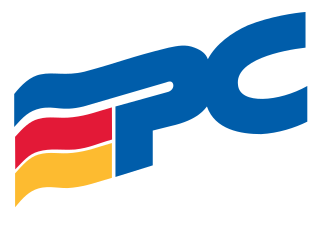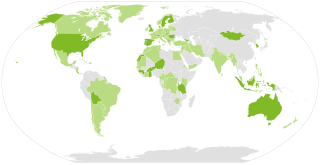External links
| Chamber of Deputies |
|
|---|---|
| Senate |
|
| Unrepresented | |
| Defunct parties |
|
| | This article about a political party in Uruguay is a stub. You can help Wikipedia by expanding it. |
The Party of the Communes (Spanish : Partido de los Comunes) is a progressive political party in Uruguay. It is a member organisation of the Broad Front Progressive Encounter-New Majority and represents local administrations.

The 1912 United States presidential election was the 32nd quadrennial presidential election, held on Tuesday, November 5, 1912. Democratic governor Woodrow Wilson of New Jersey unseated incumbent Republican president William Howard Taft while defeating former president Theodore Roosevelt and Socialist Party nominee Eugene V. Debs.

The Progressive Conservative Party of Canada was a centre to centre-right federal political party in Canada that existed from 1942 to 2003.
The Conservative Party of Canada, colloquially known as the Tories or simply the Conservatives, is a federal political party in Canada. It was formed in 2003 by the merger of the two main right-leaning parties, the Progressive Conservative Party and the Canadian Alliance, the latter being the successor of the Western Canadian–based Reform Party. The party sits at the centre-right to the right of the Canadian political spectrum, with their federal rival, the centre-left Liberal Party of Canada, positioned to their left. The Conservatives are defined as a "big tent" party, practising "brokerage politics" and welcoming a broad variety of members, including "Red Tories" and "Blue Tories".
The Progressive Party of Canada, formally the National Progressive Party, was a federal-level political party in Canada in the 1920s until 1930. It was linked with the provincial United Farmers parties in several provinces, and it spawned the Progressive Party of Saskatchewan, and the Progressive Party of Manitoba, which formed the government of that province. The Progressive Party was part of the farmers' political movement that included federal and provincial Progressive and United Farmers' parties.

The Progressive Party is an agrarian political party in Iceland.
The Vermont Progressive Party, formerly the Progressive Coalition and Independent Coalition, is a political party in the United States that is active in Vermont. It is the third-largest political party in Vermont behind the Democratic and Republican parties. As of 2023, the party has one member in the Vermont Senate and five members in the Vermont House of Representatives, as well as several more affiliated legislators who caucus with the Democratic Party.

The Progressive Conservative Party of New Brunswick is a centre-right conservative political party in the Canadian province of New Brunswick. The party has its origins in the pre-Canadian confederation Conservative Party that opposed the granting of responsible government to the colony. It has historically followed the Red Tory tradition.
The Progressive Party was a liberal party in South Africa which, during the era of apartheid, was considered the left wing of the all-white parliament. The party represented the legal opposition to apartheid within South Africa's white minority. It opposed the ruling National Party's racial policies, and championed the rule of law. For 13 years, its only member of parliament was Helen Suzman. It was later renamed the Progressive Reform Party in 1975, and then Progressive Federal Party in 1977. The modern Democratic Alliance considers the party to be its earliest predecessor.

The Progressive Canadian Party was a minor centre-right federal political party in Canada. It was registered with Elections Canada, the government's election agency, on March 29, 2004.

The Progressive Federal Party (PFP) was a South African political party formed in 1977 through merger of the Progressive and Reform parties, eventually changing its name to the Progressive Federal Party. For its duration, it was the main parliamentary opposition to apartheid, instead advocating power-sharing in South Africa through a federal constitution. From the 1977 election until 1987 it was the official opposition of the country.

The 1924 United States House of Representatives elections were elections for the United States House of Representatives to elect members to serve in the 69th United States Congress. They were held for the most part on November 4, 1924, while Maine held theirs on September 8. They coincided with the election to a full term of President Calvin Coolidge, who had replaced Warren Harding following his death.
Progressivism in the United States is a left-leaning political philosophy and reform movement. Into the 21st century, it advocates policies that are generally considered social democratic and part of the American Left. It has also expressed itself within center-right politics, such as New Nationalism and progressive conservatism. It reached its height early in the 20th century. Middle/working class and reformist in nature, it arose as a response to the vast changes brought by modernization, such as the growth of large corporations, pollution, and corruption in American politics. Historian Alonzo Hamby describes American progressivism as a "political movement that addresses ideas, impulses, and issues stemming from modernization of American society. Emerging at the end of the nineteenth century, it established much of the tone of American politics throughout the first half of the century."

The Progressive Party, popularly nicknamed the Bull Moose Party, was a third party in the United States formed in 1912 by former president Theodore Roosevelt after he lost the presidential nomination of the Republican Party to his former protégé turned rival, incumbent president William Howard Taft. The new party was known for taking advanced positions on progressive reforms and attracting leading national reformers. The party was also ideologically deeply connected with America's radical-liberal tradition. After the party's defeat in the 1912 United States presidential election, it went into rapid decline in elections until 1918, disappearing by 1920. The "Bull Moose" nickname originated when Roosevelt boasted that he felt "strong as a bull moose" after losing the Republican nomination in June 1912 at the Chicago convention.
The Progressive Party was a political party created as a vehicle for Robert M. La Follette, Sr. to run for president in the 1924 election. It did not run candidates for other offices, and it disappeared after the election. The party advocated progressive positions such as government ownership of railroads and electric utilities, cheap credit for farmers, the outlawing of child labor, stronger laws to help labor unions, more protection of civil liberties, an end to American imperialism in Latin America, and a referendum before any president could lead the nation into war.
The Progressive Party was a left-wing political party in the United States that served as a vehicle for the campaign of Henry A. Wallace, a former vice president, to become President of the United States in 1948. The party sought racial desegregation, the establishment of a national health insurance system, an expansion of the welfare system, and the nationalization of the energy industry. The party also sought conciliation with the Soviet Union during the early stages of the Cold War.
Progressivism is a left-leaning political philosophy and movement that seeks to advance the human condition through social reform – primarily based on purported advancements in social organization, science, and technology. Adherents hold that progressivism has universal application and endeavor to spread this idea to human societies everywhere. Progressivism arose during the Age of Enlightenment out of the belief that civility in Europe was improving due to the application of new empirical knowledge.

The Progressive Alliance (PA) is a political international of progressive and social democratic political parties and organisations founded on 22 May 2013 in Leipzig, Germany. The alliance was formed as an alternative to the existing Socialist International, of which many of its member parties are former or current members. The Progressive Alliance claims to have 140 participants from around the world.
Progressive conservatism is a political ideology that attempts to combine conservative and progressive policies. While still supportive of capitalist economy, it stresses the importance of government intervention in order to improve human and environmental conditions.